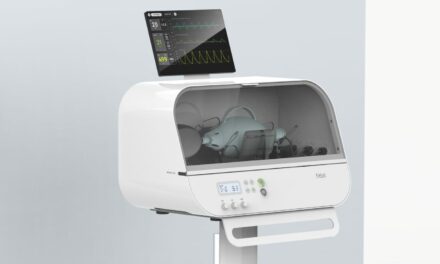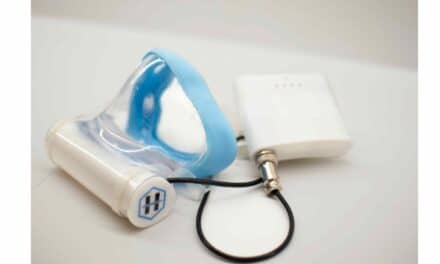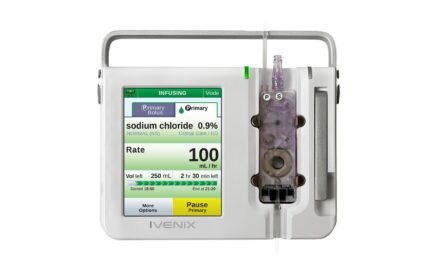GE Healthcare and AliveCor are partnering to deliver medical-grade six-lead electrocardiograms (ECGs) taken by patients on an AliveCor KardiaMobile 6L ECG device outside of the hospital setting directly into GE Healthcare’s MUSE Cardiac Management System for physicians to view and evaluate cardiac data.
This integration offers physicians access to trusted patient data within their existing workflow, helping to increase their diagnostic confidence and improving the ability to effectively manage patients proactively across the care continuum – with the goal of reducing hospitalizations linked to cardiac conditions,2 including but not limited to atrial fibrillation.3
Atrial fibrillation, the most common type of treated heart arrhythmia, is associated with a highly elevated risk of stroke. In the U.S. alone, more than 454,000 patients are hospitalized and 158,000 deaths are attributed to atrial fibrillation each year.4 AliveCor’s FDA-cleared, AI-enabled KardiaMobile 6L ECG device aids in the efficient detection of atrial fibrillation,5 as well as the detection of other heart rhythm conditions.
GE Healthcare’s MUSE, used by 87% of the top cardiac hospitals in the U.S.,6 is a vendor-agnostic solution that connects with a hospital’s EMR to manage and streamline the flow of cardiac information, enabling faster data delivery, distribution, and analysis for more informed decisions and improved patient care.
Better Cardiac Data Management
With this partnership, not only are the ECGs analyzed by GE Healthcare’s algorithms, they become part of the patient record in MUSE and the EMR so that any physician in the network involved in the patient’s care can interact with them.
“By teaming up with AliveCor, we are strengthening the connection between personal health and clinical decision making to transform cardiac care to be more convenient for patients and actionable for providers,” says Tom Westrick, president, and CEO of GE Healthcare’s Life Care Solutions business. “The KardiaMobile 6L allows patients to conveniently monitor their heart health in any environment, and by integrating its data directly into MUSE, we are offering hospitals and health systems an unprecedented amount of information to leverage for patient care within their existing clinical workflow – with the ultimate goal of improving patient outcomes and reducing the number of cardiac-related hospitalizations and the costs associated with them.”
Currently, if the patient chooses to share the remote ECG, a physician sees AliveCor six-lead ECGs on a patient’s phone in an office visit or a PDF emailed by the patient. However, because the data is not integrated into the clinical workflow of the EMR or MUSE, the physician cannot easily compare the results to prior ECGs or relevant results from other diagnostic tools and tests. With the integration of data into MUSE, the physician can compare the patient’s most recent KardiaMobile 6L ECG to prior ECGs or other relevant results, expanding diagnostic capabilities through continuity of care.
By building a workflow in MUSE that integrates the ECG data from KardiaMobile 6L into the EMR, GE Healthcare’s advanced 510(k)-cleared ECG interpretation “EK12” algorithms and AliveCor’s 510(k)-cleared artificial intelligence are solving this challenge. Static becomes dynamic, with a seamless flow of information – and now physicians will have the data at their fingertips to bring care to the next level from hospital to home.7
“Delivering medically validated ECG readings taken with KardiaMobile 6L directly into MUSE can help facilitate closer connection and better communication about treatment and care between physicians and their patients, even when they are not physically together,” says Priya Abani, CEO of AliveCor. “This integration directly supports our mission of transforming cardiology with intelligent, highly personalized heart data and connected cardiac care services by offering providers information that can be integrated seamlessly into their clinical practices, and patients the convenience, privacy, and reliability of ECG readings they can perform at home or on the go.”
A physician will prescribe or enroll KardiaMobile 6L for patients with certain cardiac diagnoses who can benefit from monitoring their condition and tracking their own ECG recordings at home or on the go. The hospital will then issue a subscription that links the patient to the hospital’s clinical desktop allowing them to perform ECGs using the KardiaMobile 6L device. After an ECG is recorded, the data automatically transfers from AliveCor’s cloud server directly into MUSE. This allows providers to quickly evaluate six-lead ECGs that indicate a heart rhythm condition and require attention, such as those that show signs of an arrhythmia, which may result in a confirmatory ECG in the hospital.
These new cardiac data capabilities will add to the Edison platform ecosystem, GE Healthcare’s intelligence platform designed to help achieve greater efficiency, improve patient outcomes, and increase access to care, by also helping to elevate patient experience and satisfaction, enhance care, and further extend care into the home.
For more information on GE Healthcare and this collaboration, visit gehealthcare.com. And to learn more about AliveCor, visit alivecor.com.
References
2 Koole MAC, Kauw D, Winter MM, Dohmen DAJ, Tulevski, II, de Haan R, et al. Neth Heart J. 2019;27(1):30-7.
3 Goldenthal IL, Sciacca RR, Riga T, Bakken S, Baumeister M, Biviano AB, et al. J Cardiovasc Electrophysiol. 2019.
4 https://www.cdc.gov/heartdisease/atrial_fibrillation.htm
5 Reed MJ, Grubb NR, Lang CC, O’Brien R, Simpson K, Padarenga M, Grant A, Tuck S. Multi-centre randomised controlled trial of a smart phone-based event recorder alongside standard care versus standard care for patients presenting to the Emergency Department with palpitations and pre-syncope – the IPED (Investigation of Palpitations in the ED) study: study protocol for a randomised controlled trial. Trials. 2018 Dec 29;19(1):711. doi: 10.1186/s13063-018-3098-1. PMID: 30594256; PMCID: PMC6311046.
6 https://www.newsweek.com/worlds-best-specialized-hospitals-2022
7 Some technologies may not be available to all customers in all regions; some may only be available via prescription provided by healthcare provider through hospital-enabled subscription.





